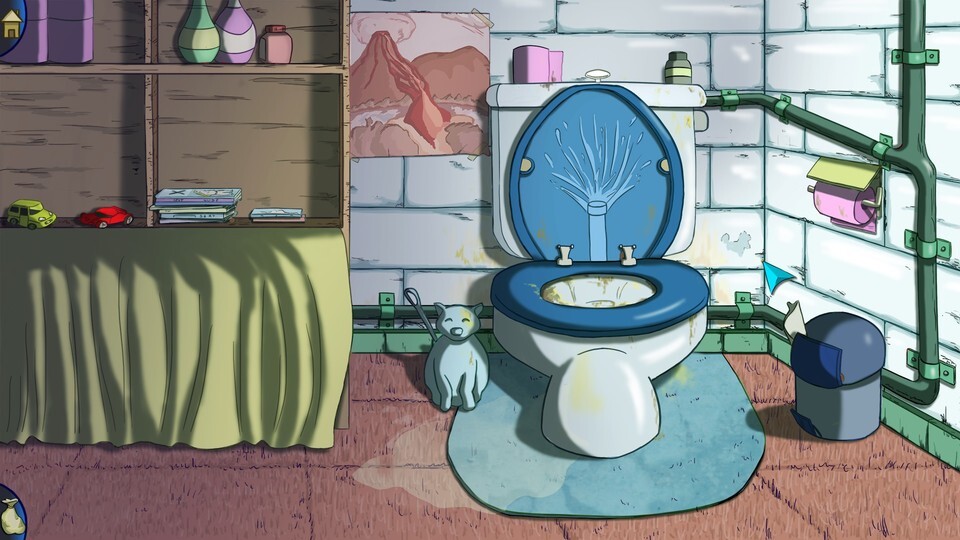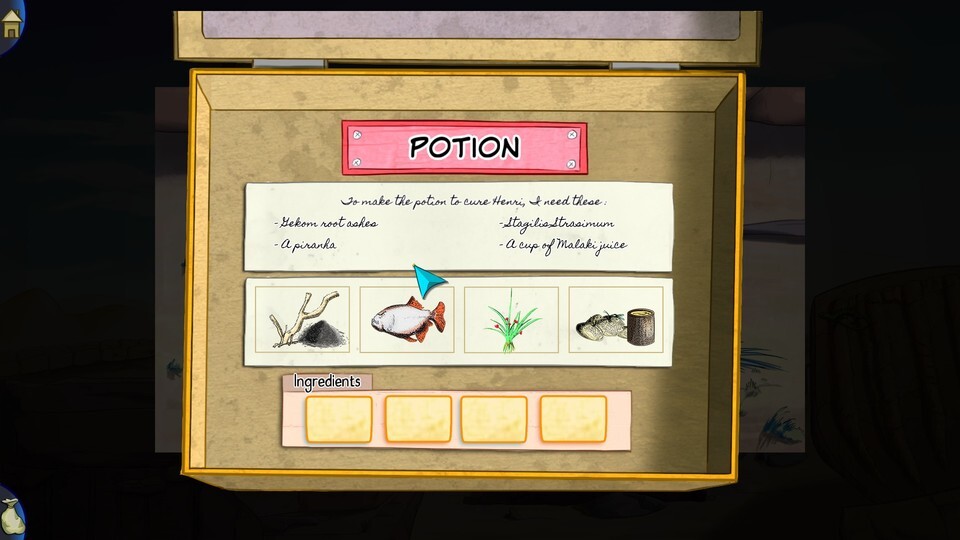Disclosure: I received a free review copy of this game from the developer.
Demetrios: The BIG Cynical Adventure is a point-and-click adventure from French indie developer Cowcat. It follows the misadventures of Bjorn Thonen, an antiques dealer from Paris who, at the beginning of the game, is the victim of a burglary, in which he loses both the contents of his wallet and an ancient mystical tablet that is in some way connected with an ancient mystical chicken statue.
The ancient mystical chicken statue in the main menu lets you know that this game’s raison d’être is humour. The gratuitous fart (complete with sound effects) in the opening cinematic lets you know that this humour is mostly about bodily functions. It becomes quite absurd at points – there are actually puzzle solutions involving both urine and vomit. Frankly, it’s not really my kind of humour, and it’s laid on really, really thick. I’m not sure who could find this many jokes about eating things off the ground and urinating in random places entertaining – I’d almost say the humour was aimed at young children, but for all the off-colour jokes about less child-friendly bodily functions.
To be fair, Demetrios does contain a lot of jokes about less disgusting things, but few hit the mark, and those that do don’t rise far above “mildly amusing”. In part, I felt this was because of the translation: Demetrios is available in a wide variety of languages in addition to the developer’s native French, and I played in English. While the text was understandable for the most part, it never shed that feeling of an inexpert translation, and there was one point late in the game where I had to use Google Translate to figure out one of the joke/puzzles (“unmount the shoes”).

Most of these types of games don’t let you enter the player character’s bathroom. This one gives it a whole two screens, one just for this lovingly rendered toilet.
What there is of a story is still less interesting than the jokes. Bjorn gets robbed, and then through a series of contrivances ends up chasing his missing tablet and another three (and of course one of them has a picture of human excrement on it) to the tiny country of Nogo, which is vaguely European, Middle Eastern and African all at the same time in not terribly funny ways (but at least we get away from Bjorn’s toilet). It’s all a lot of “and then this happened”1 without any compelling character motivations or conflicts. This is reinforced by the game’s puzzle design and even its very interface. At all times, your immediate goal is shown in a pop-out bar at the top of the screen. In its better moments, this goal reminds you of what you should be working towards and prevents directionless wandering typical of point-and-click adventure games. At other times, it’s not a reminder but the only thing in the game which gives any indication of what you’re supposed to do next – “and then this happened”.
I praised Blackwell Epiphany for puzzles which felt like part of the plot, which had you doing things that actually made you feel the part of a paranormal detective. Similarly, I really liked the way Technobabylon’s puzzles facilitated explorations of the game’s detailed sci-fi world and its technologies. If you want your adventure game not to feel like a movie that randomly pauses to make you solve a rubiks cube, it is essential to have puzzles pulling double-duty like this. Demetrios’s puzzles, by contrast, are largely uninspired fetch quests: many serve only to pad the game’s length. An entire chapter (one sixth of the game) has you go through an elaborate process to make a potion for a minor character, all so you can receive a single inventory item that comes in handy later. There’s an occasional clever puzzle or interesting bit of foreshadowing – a chase scene that appears to be a pure exercise in filler actually cleverly introduces the relationship between a character and a sound effect that acts as an important hint later on – but for the most part you just distract guards and collect items.

The interface is at least pretty and helpful.
And I’d actually be okay with all the plot contrivances and standard puzzles if they were at least the delivery vehicles for some good, funny jokes… but we’ve been over that.
Demetrios introduces some interesting interface innovations. Apart from the immediate goal display (a good idea for a better story) and fetch-quest interfaces like the one pictured above, there’s a way to highlight all clickable hotspots on the screen, and an interesting hint system in which you have to find cookies and eat them (complete with barfing noises) to receive a series of increasingly obvious hints. Finding these cookies, though, is an adventure in pixel hunting, so there were a number of occasions where I found myself seeking a solution to an outlandish and contrived adventure game puzzles by completing annoying adventure game puzzles instead.
And speaking of adventure game design sins, Demetrios includes a number of minigames, all of which you’ve seen elsewhere. There’s cast-at-the-right-time fishing, button-mash racing,2 a pop-up shooting gallery and even pinball (but not where you’d expect, making for one of the game’s funnier moments). They’re all pretty inoffensive, being functional and working as you’d expect, and none of them are difficult enough to inhibit the progress of even adventure gamers with geological reaction times.
The game also contains a few random deaths. But because any death will instantly send you back to just before you died without any loss of progress, they’re really more like bonus scenes or achievements. In any case, the majority of deaths are very telegraphed and avoidable: the game’s yes/no choice interface is used exclusively to allow you to back out of dying in stupid ways.
For some reason the game only provides five save slots, but it also appears to autosave quite frequently, and will also do on exit, so it doesn’t matter too much. It managed to save my progress pretty close to the one crash I experienced, which I was grateful for.3
I have many, many misgivings about it, but I don’t hate Demetrios. It’s plain that the game was a labour of love for its one-man dev team, and it’s certainly playable. The backgrounds are detailed (with lots of clickable objects) and have a very distinct style (though they’re ruined in places by text that looks like it was slapped on with the text insertion tool). Characters have a variety of expressions (though they’re all a bit ugly and misshapen in a way that isn’t quite excused by stylisation). There are a lot of different music tracks and sound effects to contribute to the atmosphere of the game. And the interface is genuinely one of the nicest ones I’ve found in adventure games. There are even custom descriptions for all sorts of unlikely combinations of inventory items and people – a real indicator of the blood, sweat and other bodily fluids put into this game.
Even so, I don’t recommend Demetrios. Want a humorous adventure game with questionable art? Play Jessica Plunkenstein and the Dusseldorf Conspiracy. Looking for a first-person perspective adventure game made in Game Maker (an oddly specific request)? Play Fedora Spade. Want an adventure game made by French people? Play Life is Strange. But if you really, really, really enjoy toilet humour and vicariously eating things off the ground, aren’t sick of fishing minigames and can play it in French, then sure, give Demetrios: The BIG Cynical Adventure a go. Just don’t say I didn’t warn you.
As Matt and Trey explain, events in stories should be connected with “but"s and “therefore"s, not “and then"s. And they’re all about toilet humour! ↩︎
Which just served as a reminder of how wonderfully Undertale’s snail race skewered the trope. ↩︎
On a related note, this was made in GameMaker: Studio, as I learnt from the familiar error message style. ↩︎
 David Yates.
David Yates.